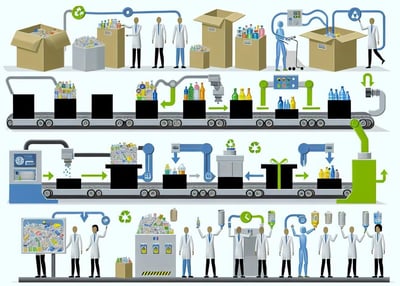Leveraging Digital Technology to Drive Sustainability in Pharmaceutical Manufacturing
Discover how Leveraging Digital Technology to Drive Sustainability contributes to Sustainability in Pharmaceutical Manufacturing.
Discover the benefits of integrating upcycling technologies with production scheduling systems for sustainable packaging manufacturing. #Sustainability #ManufacturingEfficiency
Sustainability is no longer just a buzzword; it's a necessity in packaging manufacturing. With increasing environmental concerns and consumer demand for eco-friendly products, companies are exploring innovative ways to reduce waste and lessen their environmental footprint. One such solution gaining traction is packaging material upcycling and repurposing technologies.
In this blog, we'll look into the importance of these technologies and how integrating them with production scheduling systems can revolutionize packaging manufacturing processes.

Traditional packaging materials often end up in landfills, contributing to environmental pollution and depletion of natural resources. However, with advancements in technology, it's now possible to transform waste materials into valuable resources through upcycling and repurposing.
Upcycling involves converting waste materials into new products of higher quality or value. For instance, plastic bottles can be upcycled into durable packaging containers, reducing the need for virgin materials. Repurposing, on the other hand, entails finding alternative uses for waste materials without significantly altering their form. This could involve using cardboard boxes as packaging filler or turning discarded paper into pulp for packaging material.
By implementing upcycling and repurposing technologies, packaging manufacturers can achieve several benefits:
Environmental Sustainability: Reducing reliance on virgin materials conserves natural resources and reduces greenhouse gas emissions associated with production processes.
Cost Savings: Utilizing recycled materials often costs less than sourcing virgin materials, leading to potential cost savings for manufacturers.
Enhanced Brand Image: Embracing sustainable practices can improve brand reputation and attract eco-conscious consumers.
Regulatory Compliance: Meeting stringent environmental regulations becomes easier when adopting sustainable packaging practices.
![]()

Now, let's explore how integrating these technologies with production scheduling systems can optimize manufacturing processes and maximize efficiency. One of the key components of such integration is the seamless connection between production scheduling software like PlanetTogether and Enterprise Resource Planning (ERP), Supply Chain Management (SCM), and Manufacturing Execution Systems (MES) such as SAP, Oracle, Microsoft Dynamics, Kinaxis, Aveva, and others.
Real-time Data Exchange: Integration enables real-time exchange of data between production scheduling systems and ERP/MES systems. This ensures that production schedules are synchronized with inventory levels, order requirements, and material availability, allowing for efficient planning and utilization of recycled materials.
Demand Forecasting and Inventory Management: By leveraging data analytics capabilities within ERP and SCM systems, manufacturers can accurately forecast demand for recycled materials and optimize inventory levels. This enables production schedulers to plan production runs more effectively, minimizing waste and maximizing resource utilization.
Dynamic Scheduling: Integrating production scheduling systems with ERP/MES allows for dynamic scheduling adjustments based on changing demand patterns, resource availability, and material availability. This agility is crucial in maximizing the use of recycled materials while meeting customer delivery requirements.
Quality Control and Traceability: With integrated systems, manufacturers can track the origin and quality of recycled materials throughout the production process. This ensures compliance with quality standards and provides transparency to customers regarding the sustainability of the packaging materials used.
Performance Monitoring and Continuous Improvement: By analyzing data generated by integrated systems, production schedulers can identify bottlenecks, optimize production processes, and drive continuous improvement initiatives. This results in increased operational efficiency and reduced environmental impact over time.
Packaging material upcycling and repurposing technologies offer immense potential for sustainability and cost savings in the manufacturing industry. By integrating these technologies with production scheduling systems, manufacturers can unlock new opportunities for efficiency, innovation, and environmental stewardship. As the demand for sustainable packaging solutions continues to grow, embracing integration between PlanetTogether and ERP/MES systems will be essential for staying competitive in the market.
Remember, the journey towards sustainability begins with a single step, and integrating upcycling and repurposing technologies into your production scheduling processes is a significant stride towards a greener future. Let's work together to reshape the packaging industry and pave the way for a more sustainable tomorrow.
Are you ready to take your manufacturing operations to the next level? Contact us today to learn more about how PlanetTogether and integrated scheduling solutions can help you achieve your sustainability goals and drive success in the packaging industry.
Discover how Leveraging Digital Technology to Drive Sustainability contributes to Sustainability in Pharmaceutical Manufacturing.
Optimize green metalworking with integrated solutions. Explore sustainable production planning for a harmonized future. #Manufacturing...
Discover how integrating Planettogether with ERP systems revolutionizes sustainable manufacturing in the food & beverage industry. #Sustainability
Be the first to know about new B2B SaaS Marketing insights to build or refine your marketing function with the tools and knowledge of today’s industry.